Unit 9 Have you ever been to a museum 重要知识点复习课件
文档属性
| 名称 | Unit 9 Have you ever been to a museum 重要知识点复习课件 | 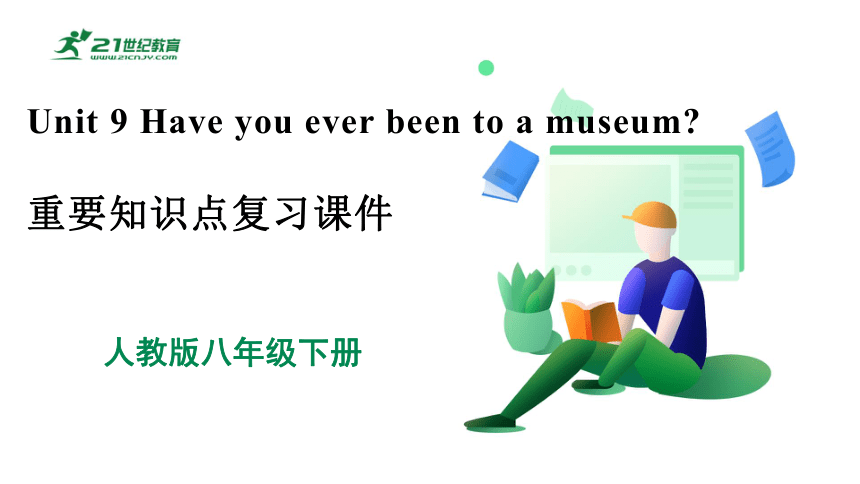 | |
| 格式 | pptx | ||
| 文件大小 | 1.1MB | ||
| 资源类型 | 试卷 | ||
| 版本资源 | 人教新目标(Go for it)版 | ||
| 科目 | 英语 | ||
| 更新时间 | 2022-07-07 10:26:40 | ||
图片预览

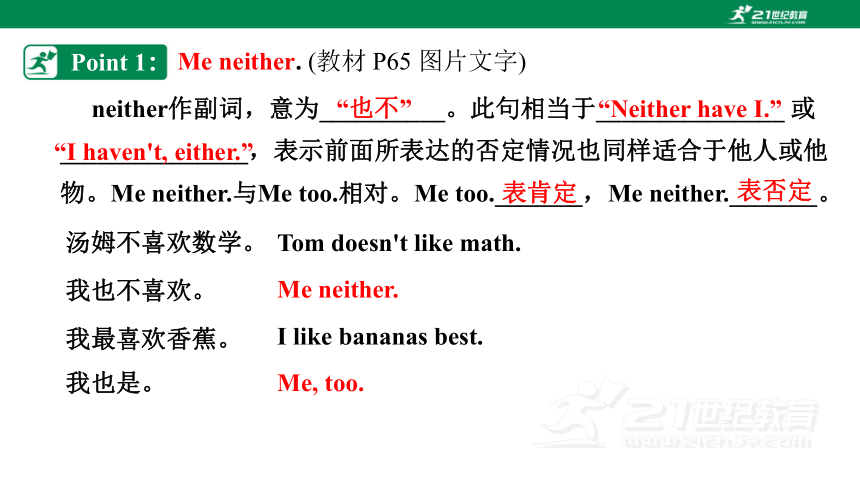
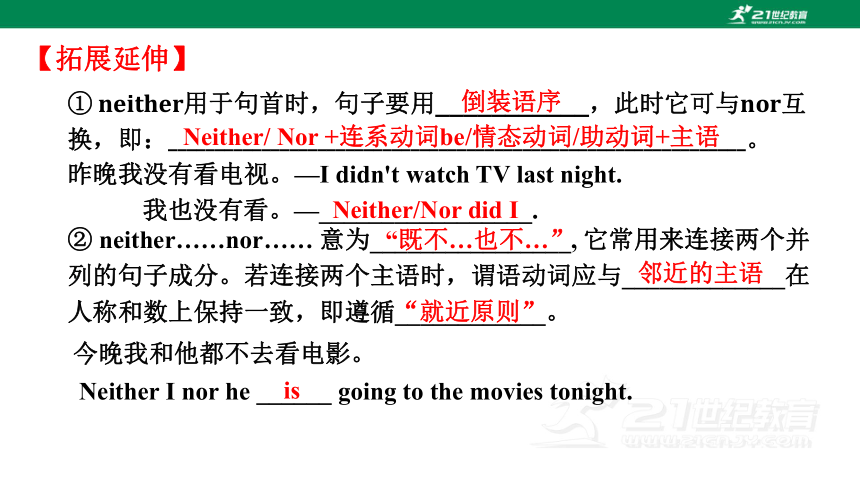
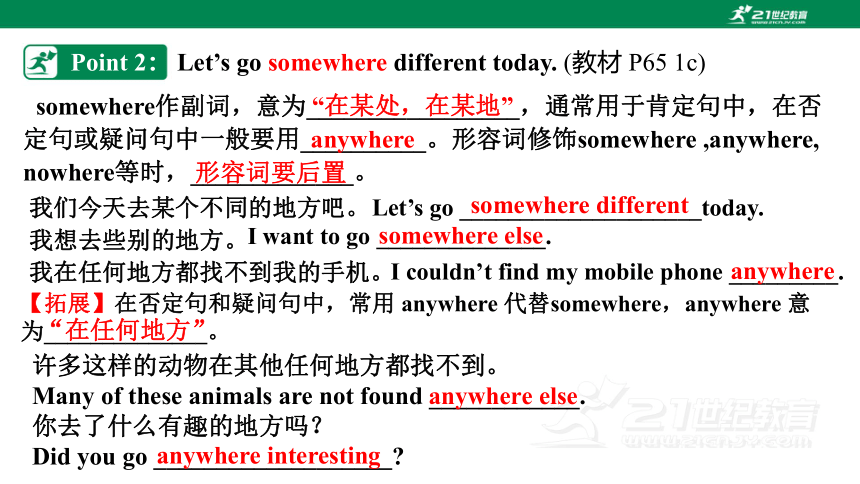
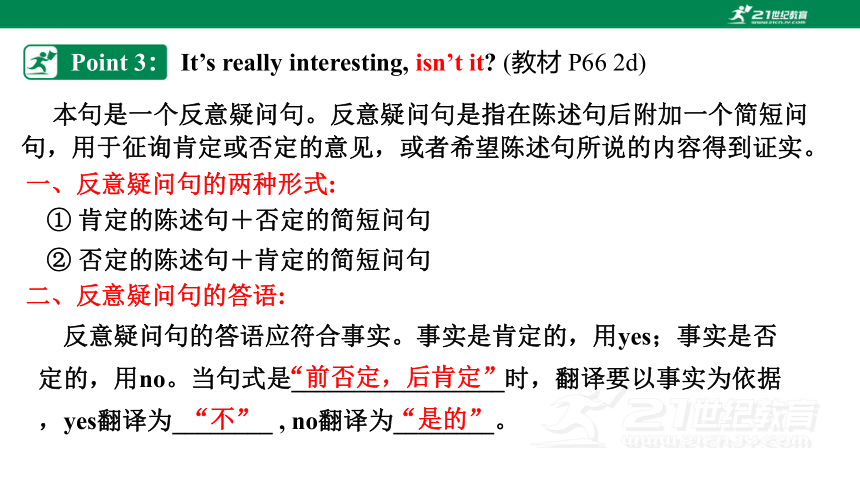
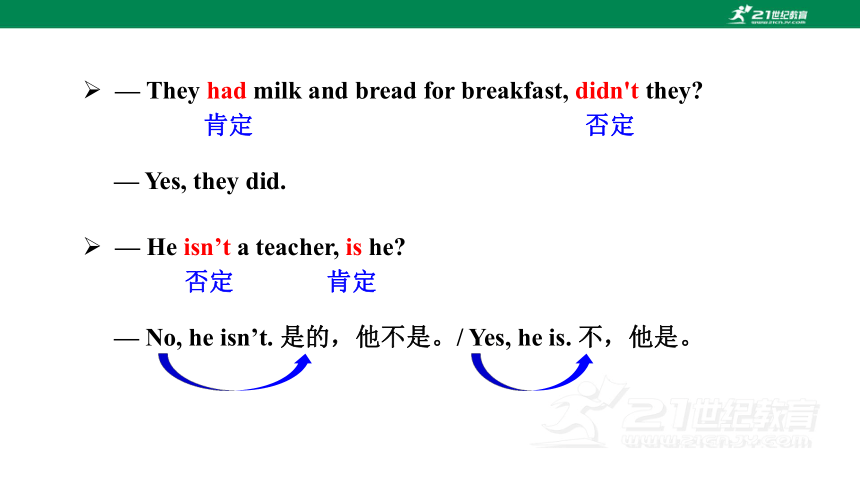
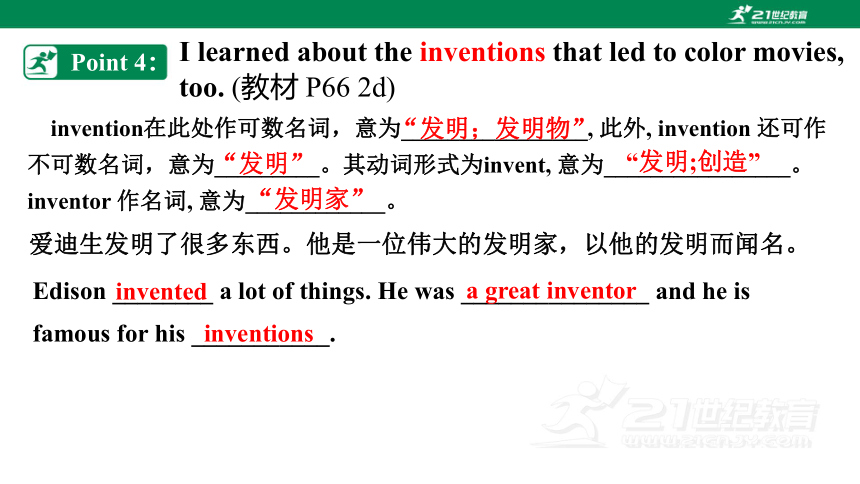
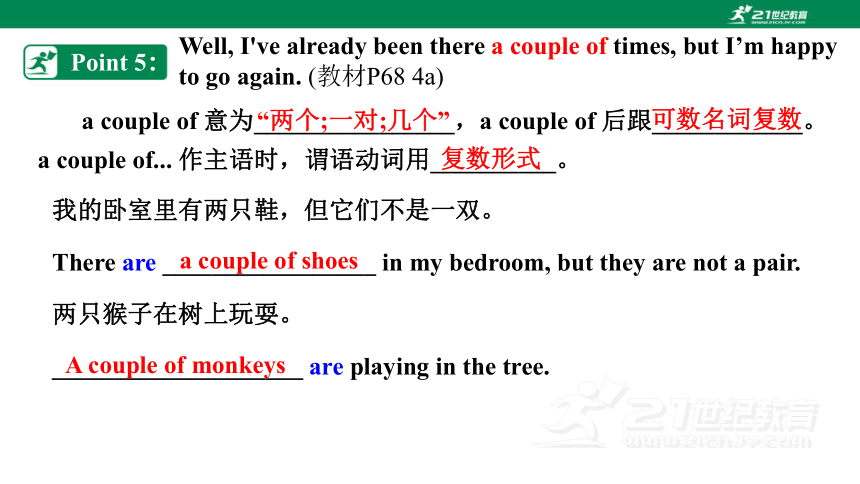
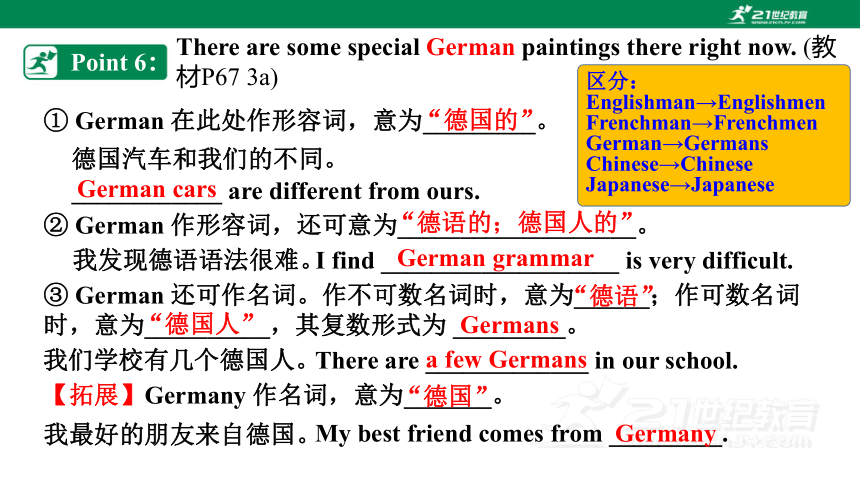
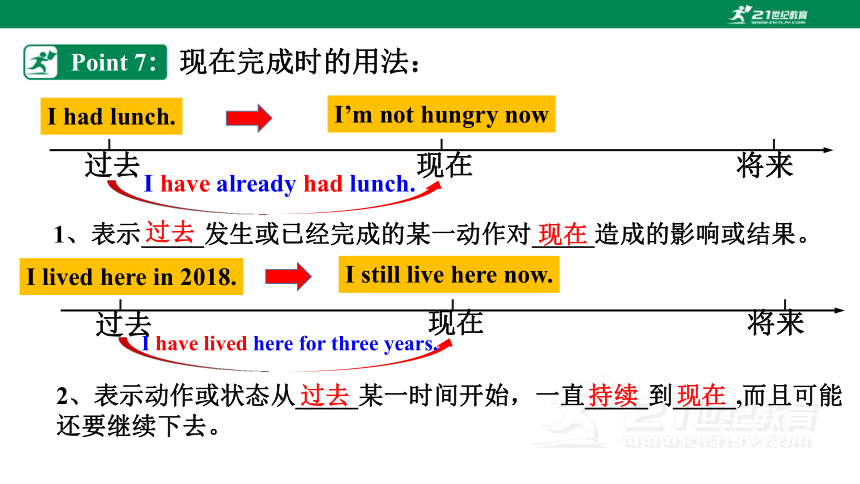
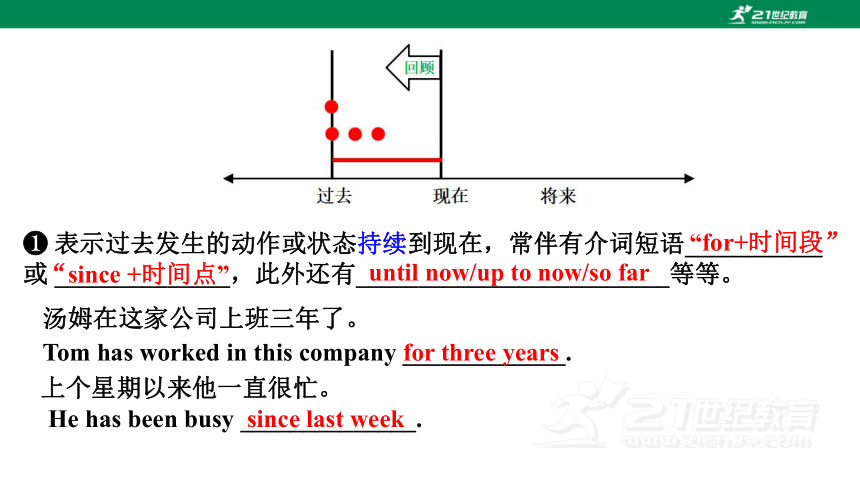
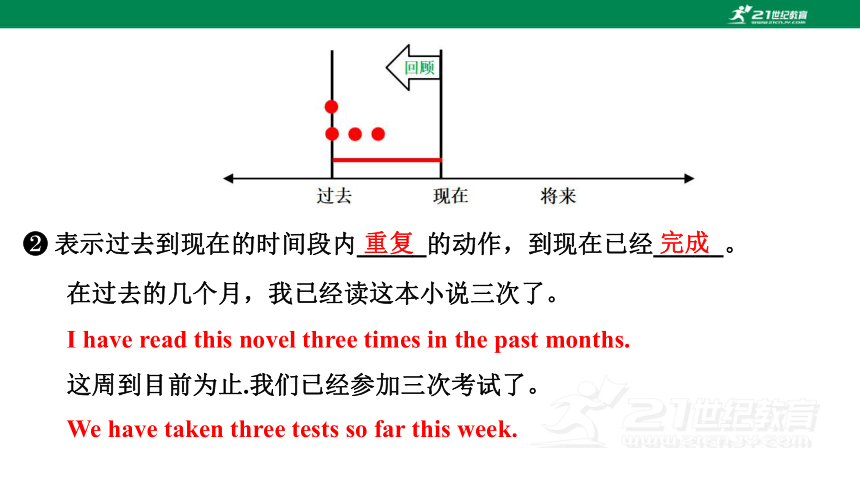
文档简介
(共45张PPT)
Unit 9 Have you ever been to a museum
重要知识点复习课件
人教版八年级下册
Point 1:
Me neither. (教材 P65 图片文字)
neither作副词,意为__________。此句相当于_______________ 或 _______________,表示前面所表达的否定情况也同样适合于他人或他物。Me neither.与Me too.相对。Me too._______,Me neither._______。
汤姆不喜欢数学。
我也不喜欢。
我最喜欢香蕉。
我也是。
“也不”
“Neither have I.”
“I haven't, either.”
表肯定
表否定
Tom doesn't like math.
Me neither.
I like bananas best.
Me, too.
【拓展延伸】
① neither用于句首时,句子要用___________,此时它可与nor互换,即:______________________________________________________________。
昨晚我没有看电视。—I didn't watch TV last night.
我也没有看。—_________________.
② neither……nor…… 意为________________, 它常用来连接两个并列的句子成分。若连接两个主语时,谓语动词应与_____________在人称和数上保持一致,即遵循____________。
Neither I nor he ______ going to the movies tonight.
倒装语序
Neither/ Nor +连系动词be/情态动词/助动词+主语
Neither/Nor did I
“既不…也不…”
邻近的主语
“就近原则”
is
今晚我和他都不去看电影。
Point 2:
Let’s go somewhere different today. (教材 P65 1c)
somewhere作副词,意为_________________,通常用于肯定句中,在否定句或疑问句中一般要用__________。形容词修饰somewhere ,anywhere, nowhere等时,_____________。
“在某处,在某地”
anywhere
形容词要后置
我们今天去某个不同的地方吧。
Let’s go ____________________today.
我想去些别的地方。
I want to go ______________.
我在任何地方都找不到我的手机。
I couldn’t find my mobile phone _________.
【拓展】在否定句和疑问句中,常用 anywhere 代替somewhere,anywhere 意为______________。
“在任何地方”
许多这样的动物在其他任何地方都找不到。
Many of these animals are not found ____________.
你去了什么有趣的地方吗?
Did you go ___________________
anywhere else
anywhere interesting
somewhere different
somewhere else
anywhere
Point 3:
It’s really interesting, isn’t it (教材 P66 2d)
本句是一个反意疑问句。反意疑问句是指在陈述句后附加一个简短问句,用于征询肯定或否定的意见,或者希望陈述句所说的内容得到证实。
一、反意疑问句的两种形式:
① 肯定的陈述句+否定的简短问句
② 否定的陈述句+肯定的简短问句
反意疑问句的答语应符合事实。事实是肯定的,用yes;事实是否定的,用no。当句式是_________________时,翻译要以事实为依据,yes翻译为________ , no翻译为________。
二、反意疑问句的答语:
“前否定,后肯定”
“不”
“是的”
— They had milk and bread for breakfast, didn't they
— Yes, they did.
肯定
否定
— He isn’t a teacher, is he
— No, he isn’t. 是的,他不是。/ Yes, he is. 不,他是。
肯定
否定
Point 4:
I learned about the inventions that led to color movies, too. (教材 P66 2d)
invention在此处作可数名词,意为________________, 此外, invention 还可作不可数名词,意为_________。其动词形式为invent, 意为________________。inventor 作名词, 意为____________。
“发明;发明物”
“发明”
“发明;创造”
“发明家”
爱迪生发明了很多东西。他是一位伟大的发明家,以他的发明而闻名。
Edison ________ a lot of things. He was _______________ and he is famous for his ___________.
invented
a great inventor
inventions
Point 5:
Well, I've already been there a couple of times, but I’m happy to go again. (教材P68 4a)
a couple of 意为________________,a couple of 后跟____________。a couple of... 作主语时,谓语动词用__________。
“两个;一对;几个”
可数名词复数
复数形式
我的卧室里有两只鞋,但它们不是一双。
There are _________________ in my bedroom, but they are not a pair.
两只猴子在树上玩耍。
____________________ are playing in the tree.
a couple of shoes
A couple of monkeys
Point 6:
There are some special German paintings there right now. (教材P67 3a)
① German 在此处作形容词,意为_________。
德国汽车和我们的不同。
____________ are different from ours.
② German 作形容词,还可意为___________________。
我发现德语语法很难。
I find ___________________ is very difficult.
③ German 还可作名词。作不可数名词时,意为______;作可数名词时,意为__________,其复数形式为 _________。
我们学校有几个德国人。
There are _____________ in our school.
【拓展】Germany 作名词,意为_______。
我最好的朋友来自德国。
My best friend comes from _________.
区分:
Englishman→Englishmen
Frenchman→Frenchmen
German→Germans
Chinese→Chinese
Japanese→Japanese
“德国的”
German cars
“德语的;德国人的”
German grammar
“德语”
“德国人”
Germans
a few Germans
“德国”
Germany
现在完成时的用法:
过去
现在
将来
I had lunch.
I’m not hungry now
I have already had lunch.
1、表示_____发生或已经完成的某一动作对_____造成的影响或结果。
过去
现在
2、表示动作或状态从_____某一时间开始,一直_____到_____,而且可能还要继续下去。
过去
现在
将来
I lived here in 2018.
I still live here now.
I have lived here for three years.
过去
现在
持续
Point 7:
表示过去发生的动作或状态持续到现在,常伴有介词短语___________ 或 ______________,此外还有_________________________等等。
“for+时间段”
“since +时间点”
until now/up to now/so far
汤姆在这家公司上班三年了。
Tom has worked in this company _____________.
上个星期以来他一直很忙。
He has been busy ______________.
for three years
since last week
表示过去到现在的时间段内_____的动作,到现在已经_____。
重复
在过去的几个月,我已经读这本小说三次了。
I have read this novel three times in the past months.
这周到目前为止.我们已经参加三次考试了。
We have taken three tests so far this week.
完成
表示过去发生的动作对现在造成的_______。
我已经完成作业了。
I have already finished my homework.
有人把窗户打破了。
Someone has broken the window.
影响
① 肯定句:主语 + ___________ + __________ + 其他.
现在完成时的结构:
have/has
过去分词
主语 助动词 过去分词 其他成分
I(第一人称单数) have V.(动词)+ed 其他
he, she, it(第三人称单数) has you(第二人称单数/复数) have we, they(第一、三人称复数) have 我买了许多有关西方风俗的书。
I _____________ lots of books about Western customs.
他已经看过这部电影了。
He ______ already _______ the film.
have bought
has seen
② 否定句:主语 + ___________ + __________ + 其他.
have/has not
过去分词
主语 助动词 否定词not 过去分词 其他成分
I(第一人称单数) have have not(haven’t) V.(动词)+ed 其他
he, she, it(第三人称单数) has has not(hasn’t) you(第二人称单数/复数) have have not(haven’t) we, they(第一、三人称复数) have have not(haven’t) 埃里克还没有买到飞机票。
Eric ____________ his plane tickets yet.
从离开那天起,迈克一家就再也没去过加拿大。
The Mikes _______________ Canada since the day they left.
hasn't bought
haven't been to
③ 一般疑问句:_________ + 主语 + _________ + 其他
否定回答:_________, 主语 + ______________.
肯定回答:_________, 主语 + ___________.
Have/Has
Yes
have/has
haven’t/hasn’t
过去分词
No
have not=haven’t
has not=hasn’t
你读过《西游记》吗?
是的,我已经看了。
不,我还没看过。
_______ you ________ Journey to the West
Have read
Yes, I have.
No, I haven't.
她在这里住了两年了吗?
_______ she _________ here for 2 years
是的,他住两年了。
Yes, she has.
不,他没有住两年
No, she hasn't.
Has lived
③ 特殊疑问句:特殊疑问词+_________ + 主语 + _________ + 其他
have/has
过去分词
你到这儿多久了?
_______________ have you been here
你去过长城几次?
_____________________ have you been to the Great Wall
你读过哪本书?
_______________ have you read
How long
How many times
Which book
过去分词变化形式
(直 去 双 改 特)
过去分词与动词过去式变法规则基本一样。
变化规则 例词 一般情况下____________ work worked
jump jumped
look looked
以不发音字母e结尾的动词,___________ like liked
live lived
use used
以重读闭音节结尾且末尾只有一个辅音字母的动词,____________________________ stop stopped
plan planned
shop shopped
以辅音字母加“y”结尾的动词,要先____________,再加-ed,以元音字母加“y”结尾的动词,直接加-ed study studied
carry carried
play played
直接加-ed
去e加ed
双写该辅音字母后再加-ed
改“y”为“i”
过去分词不规则变化
(特)
现在式 过去式 过去分词 现在式 过去式 过去分词
be have
read [ri d] see
eat fight
fall feel
find fly
forget get
give go
hit hurt
know lead
was/were
been
had
had
read[red]
read[red]
saw
seen
ate
eaten
fought
fought
fell
fallen
felt
felt
found
found
flew
flown
forgot
forgotten
got
got
gave
given
gone
went
hit
hit
hurt
hurt
knew
known
led
led
现在式 过去式 过去分词 现在式 过去式 过去分词
leave hear
keep write
learn shoot
sit sing
sleep speak
spend stand
sweep swim
take teach
tell think
throw understand
wear win
left
left
heard
heard
kept
kept
learnt
learnt
shot
shot
sat
sat
sang
sung
slept
slept
spoke
spoken
spent
spent
stood
stood
swept
swept
swam
swum
took
taken
taught
taught
told
told
thought
thought
threw
thrown
understood
understood
wore
worn
won
won
wrote
written
3. ABA格式(动词原形与过去分词同形)
run→ran→run
come→came→come
become→became→become
4. ABC格式(动词原形、过去式、过去分词均不同形)
bear→bore→born
break→broke→broken
grow→grew→grown
5. AAB格式(动词原形与过去式同形)
beat→beat→beaten
1. AAA格式(动词原形、过去式、过去分词同形)
let→let→ let
put→put→put
read→read→read
2. ABB格式(过去式与过去分词同形)
feel→felt→felt
keep→kept→kept
sleep→slept→slept
不规则变化需要总结
现在完成时标志词
现在完成时不能和表示_______________连用,如:yesterday,last year,in 1980,three days ago,just now,when I came in等。现在完成时标志词有:already_______,ever_______,just_______,so far _______,yet__________,before_________,for+时间段___________,since+加时间点/一个过去式的句子____________________。
过去的时间状语
“已经”
“曾经”
“刚刚”
“至今”
“已经、还”
“…之久”
“自从…(到现在)”
“以前”
1、already_______,常用于________中,通常放在_______________,也可放________。
“已经”
肯定句
动词过去分词前
句末
我已经读过这本故事书了。
我已经洗了衣服。
I have ________ read this storybook.
I’ve washed my clothes _________.
already
already
表示吃惊等感彩时, already也可用于____________(口语)
疑问句
你(真的)已经见过他了
Have you met him _______
already
2、yet用在_______中意为______,用在______中意为______,放在______。
疑问句
“已经”
否定句
“还”
句尾
他已经找到他的手表了吗?
不,还没有。
Has he found his watch _____
No, not _____.
那位妇女还没有找到她的狗。
The woman hasn’t found her dog _____.
yet
yet
yet
3、just意为________,放在_________________。而just now__________,放在________,且代表___________________。
“刚刚”
动词过去分词之前
“刚刚”
句尾
“一般过去时”
他刚从学校回来。
He has _____ come back from school.
我刚刚完成我的家庭作业。
I finished my homework ________.
just
just now
4、so far意为________________________, 意义和用法相同的还有___________,___________放在___________。
“倒现在为止;迄今为止”
up to now
up till now
句首或句尾
到现在为止,我已乘火车旅行三次了。
I have travelled by train three times ________.
________, I have travelled by train three times.
so far
So far
5、ever意为_______,放在_________________。
“曾经”
动词的过去分词之前
你曾去过北京吗?
Have you _____ been to Beijing
我未曾和她说过话。
I haven't ______ spoken to her.
ever
ever
6、before意为_______,指过去不确定的某个时间,总是放在______,
“以前”
句末
你以前去过上海吗?
Have you been to Shanghai ________
我以前没吃过四川菜。
I haven’t eaten Sichuan food ________.
before
before
7、since意为______________,后面要跟______,或_________________,用于过去完成时。
“自从…(到现在)”
时间点
一个过去式的句子
8、for 意为_____________,后面要跟________,用于过去完成时。
“……之久”
时间段
________ 1984 ________ yesterday
________ about two days ________ two years
________ I was 10 for about two days ________ 10 years ago
________ threyears ago ________ over twenty years
________ she was a little girl ________ 10 years ago
He has been away ________ last week. ________ one week
since
for
since
since
since
since
since
since
since
for
for
for
口诀记忆: 句尾:since,for,yet
动前:ever,just
动前句尾:already
so far 前后,before后,
现在完成已看透。
________ 5 years ________ last Monday
________ you came here ________ a long time
________ 2018 ________ his 7th birthday
________ 2 days ________ 2 days ago
for
for
since
for
since
since
since
since
现在完成时与一般过去时的区别一
现在
过去
将来
比较:1. A: What did you do last weekend
B: I saw a new movie.
2. A: Would you like to see the movie with me
B: Thanks for your inviting, but I have seen it already.
总结 一般过去时 现在完成时
1.用法不同
(只谈论上周末做的事情,不涉及现在)
(影响:因为已经看过了,所以现在不去看了)
只表示过去的动作或状态
(不涉及现在)
表示过去发生的事情对现在造成的影响或结果
(与现在有联系)
现在完成时与一般过去时的区别二
比较:1. Tom ___________ (sweep) the floor yesterday.
2. My family ___________ (go) to Beijing last year.
3. I ___________ (can ) ride a bike when I was 6 years old.
4. I ________________ (not finish) my homework yet.
5. He ___________ (work) in the city for eight years.
6.判断正误: I have visited my grandparents yesterday.
He has finished his work two days ago.
(注:现在完成时的不能与表示过去的时间状语连用)
swept
went
could
haven’t finished
has worked
总结 一般过去时 现在完成时
2.时间状语不同
already, yet, just, ever, never, so far, for+时间段,since+时间点\从句...
yesterday, last week, ...ago, in 1995,in the past, just now, when...
have/has been to 与 have/has gone to 的区别
have/has been to 表示_________________,暗指现在_____________。后可接次数,如 once, twice, three times 等,表示_________________,也可和 just,never,ever等连用。 我姐姐去过大连两次。
你曾经去过西湖吗
have/has gone to 表示______________,暗含说话时该_____________。 吉姆在哪里
他去英国了。
“曾经去过某地”
“去过某地几次”
“去某地了”
已不在那里了
人不在现场
My sister has been to Dalian twice.
Have you ever been to the West Lake
Where is Jim
He has gone to England.
Point 8:
It's unbelievable that technology has progressed in such a rapid way! (教材P67 3a)
unbelievable 形容词,意为_______________________,由“否定前缀________________”构成,其反义词是 believable___________。
un- + believable
“难以置信的;不真实的”
“可信的”
你告诉我们的故事太不可思议了。
The story you told us is so ____________.
unbelievable
【拓展】由否定前缀un-构成的其他常见词汇:
unhappy____________,unlucky____________,unfriendly____________,unknown____________,unfair____________
(不幸福的)
(不幸的)
(不友好的)
(不知名的)
(不公平的)
Point 9:
It's unbelievable that technology has progressed in such a rapid way! (教材P67 3a)
progress用作不及物动词,意为_____________。progress还可用作不可数名词,意为_________。常用 much,great,rapid 等形容词修饰。常用短语 make progress (in……)意为______________________。
“进步;进展”
“进步”
“(在……方面)取得进步”
工作正在缓慢进行。
你的英语进步了。
我们在英语学习方面取得了很大进步。
We have made _____________in learning English.
The work _____________ slowly.
You __________________ in your English.
is progressing
have made progress
great progress
Point 10:
It's unbelievable that technology has progressed in such a rapid way! (教材P67 3a)
rapid作形容词,意为________________;其副词形式为_________,意为_________________。
rapidly
“迅速的;快速的”
“迅速地;快速地”
随着科学技术的飞速发展,中国已经进入了一个新的时代。
______________________________________________, China has entered a new area.
With the rapid development of science and technology
通过蔡伦的造纸方法,中国文化在接下来的几个世纪里发展得更快。
With Cai Lun's papermaking method, Chinese culture grew ___________ over the next several centuries.
more rapidly
Point 11:
It also encourages governments and social groups to think about ways to improve toilets in the future. (教材P67 3a)
encourage动词,意为_______。其常用结构为 encouragesb.to do sth.意为___________________。encourage sb. in … _______________________。encouragement作名词,意为__________________________。
“鼓励”
“鼓励某人做某事”
在……方面鼓励某人
“鼓励;起激励作用的事物”
玛丽的老师经常鼓励她积极乐观。
Mary's teacher often _________________________.
我父亲在梦中鼓励我成为一名模特。
My father __________________________to be a model.
在鼓励下,萨利开始和其他孩子一起玩。
__________________, Sally is starting to play with the other children.
encourages her to be positive
encouraged me in my dream
With encouragement
Point 12:
It also encourages governments and social groups to think about ways to improve toilets in the future. (教材P67 3a)
social作形容词,意为_________,常用在名词前作定语。
我们应该合理地对待一些社会问题。
We should treat __________________ reasonably.
【拓展】social的名词形式为society,意为_______。
如今,安全教育已引起全社会的关注。
Nowadays, the education of safety has caught the attention of the _____________.
some social problems
whole society
“社会”
“社会的”
Point 13:
I've finally realized why my grandpa loves drinking tea and collecting tea sets. (教材P67 3a)
collect v. __________。collection n. ____________。collector n. _______。
收集;采集
收藏;收藏品
收藏家
我喜欢集邮,而我弟弟喜欢收集硬币
I like ________________ while my brother likes collecting coins.
这位著名的收藏家在过去的五十年里收集了许多东西。他的藏品价值连城。
___________________ _____________ many things in the past fifty years. His ___________ are priceless.
collecting stamps
The famous collector
has collected
collections
Point 14:
例句1、2中,how long意为___________,是对_________进行提问。for与表示一段时间的词连用,表示做某事多长时间了,常用于___________,表示从__________开始,持续到现在的________和__________。
例句3、4和中的how soon意为___________,是对____________进行提问,常用于一般将来时的句子。
1. How long have you been in China ______________________________
I’ve been here for two weeks. ______________________________
2. How long have you been in Beijing ______________________________
I have been in Beijjng for two years. ______________________________
3. How soon will he come back ______________________________
In two weeks. ______________________________
4. How soon will Mr. Li come back ______________________________
你来中国多长时间了
我来中国已经两个星期了。
你来北京多久了
我来北京已经两年了。
他多久会回来
两周后。
李先生多久以后回来
多久,多长
时间段
现在完成时
过去某时
动作
状态
多久以后
in+时间段
Point 15:
1. I have been to Shanghai twice. ______________________
2. My father has gone to Shanghai for a meeting.
__________________________________________
3. The old man has been in the city for many years.
__________________________________________
总结句式结构:
(1)主语+have/has been to +地点
“去过某地已返回”
(2)主语+have/has gone to +地点
“去了某地未回”
(3)主语+have/hasbeen in+地点+for+段时间
待在某地,动作可以延长一定时间,后面常接段的时间
我去过上海两次。
我爸爸去了上海开会。
那个老人已经在这个城市很多年了。
Point 16:
On the one hand, more than three quarters of the population are Chinese, … On the other hand, … (教材P70 2b)
on the one hand… on the other hand…意为_______________________。其中on the one hand中的the_________。
“一方面…另一方面…”
可以省略
一方面,他们想要孩子,但另一方面,他们又不想放弃自由自在的生活。
________________ they'd love to have kids, but ________________, they don't want to give up their freedom.
一方面,老师应该照顾好学生,另一方面,学生应该尊重老师。
_______________, teachers should take good care of the students, ________________, students should respect their teachers.
On (the) one hand
on the other hand
On the one hand
on the other hand
Point 17:
For thousands of tourists from China, this small island in Southeast Asia is a wonderful and safe place to take a holiday. (教材P70 2b)
thousand_______,其用法与数词hundred_______,million数词,意为_______,billion_______相同,具体如下:
“千”
“百”
“百万”
“十亿”
① 与具体数字连用时,用单数。
他准备支付2000万元。
He was prepared to pay _________________.
他已经售出了120万张唱片。
He's sold more than ___________________.
② 当表示泛指数目时,要用复数,且后面要接介词of,再接名词。hundreds of________________________;thousands of“_____________,_____________”;millions of“________________________”。
他们每年种植成千上万棵树。
They plant ________________ every year.
数千人来看了那个展览。
___________________ came to see the show.
two thousand yuan
120 thousand records
“数以百计的;成百上千的”
数以千计的
成千上万的
“数以百万计的;上百万的”
thousands of trees
Thousands of people
口诀:模糊数字两有(有-s,有of);具体数字两无(无-s,无of)。
Point 18:
On the one hand, more than three quarters of the population are Chinese, … On the other hand, … (教材P70 2b)
英语中的分数表达法为:分子用__________,分母用__________;当分子大于1时,分母要用___________。
基数词
序数词
复数形式
四分之一___________ 二分之一___________
三分之二___________ 五分之一___________
a quarter
a half
two thirds
one fifth
分数作主语时,谓语动词的单复数形式取决于分数后所接的__________,如果是复数名词或代词,谓语一动词用_______形式;如果是不可数名词或单数名词,则谓语动词要用_______形式。
名词和代词
复数
单数
五分之三的水是脏的。
我们班五分之三的学生是女生。
__________ of the water ______ dirty.
__________ of the students in our class ______ girls.
Three fifths
is
Three fifths
are
Point 19:
Maybe you fear that you won't be able to find anything good to eat when you travel. (教材P70 2b)
① fear 在此处作及物动词,意为____________,相当于_____________。
孩子们通常害怕晚上独自外出。
Children usually __________________ at night.
他害怕失去工作,所以他每天都努力工作。
He ______ that he may lose his job, so he works hard every day.
② fear 还可作名词,意为_____________ 。be in fear of _______________。
不要让一点点恐惧阻止你得到你想要的。
Don't let ___________ stop you from getting what you want.
我们害怕老虎。
We ____________ tigers.
“害怕;惧怕”
be afraid of
fear to go out alone
fears
“害怕;惧怕”
“害怕…;担心…”
a little fear
are in fear of
Point 20:
Whether you like Indian food, Western food or Japanese food, you'll find it all in Singapore!(教材P70 2b)
① 在此处 whether 作连词,常与 or 连用,意为__________________;_________________,引导让步状语从句。
“不管……(还是)
或者……(或者)
不管消息是真是假,你都应该做好准备。
____________________________, you should be prepared.
我要打电话叫医生来,不管你愿不愿意。
I'm calling the doctor, ______________________.
Whether the news is true or not
whether you like it or not
② whether 作连词,还可意为_______,引导宾语从句(名词从句)。
“是否”
我的同桌问我是否需要帮助。
My deskmate asked me _______ I needed any help.
whether
Point 21:
So you can choose to go whenever you like — spring, summer, autumn or winter. (教材P70 2b)
whenever连词,意为______________________________,与no matter when同义。类似的词还有:whatever = no matter what______________; however = no matter how ___________;wherever = no matter where __________;whichever = no matter which ____________;whoever = no matter who _________
“无论何时;在任何……时候”
无论什么
不管怎样
无论哪里
无论哪一 个
无论谁
你随便什么时候想来就来看我吧。
Come and visit me _______________________ you want.
你无论何时需要帮助都可以提出来。
You can ask for help _______________________ you need it.
无论何时发生,肯定不是上星期五。
_______________________ it happened, it was certainly not last Friday.
无论你是谁,你都必须遵守校规。
_______________________ you are, you must obey the school rules.
whenever/no matter when
Whenever/No matter when
Whenever/No matter when
whenever/no matter when
谢谢
21世纪教育网(www.21cnjy.com)
中小学教育资源网站
兼职招聘:
https://www.21cnjy.com/recruitment/home/admin
Unit 9 Have you ever been to a museum
重要知识点复习课件
人教版八年级下册
Point 1:
Me neither. (教材 P65 图片文字)
neither作副词,意为__________。此句相当于_______________ 或 _______________,表示前面所表达的否定情况也同样适合于他人或他物。Me neither.与Me too.相对。Me too._______,Me neither._______。
汤姆不喜欢数学。
我也不喜欢。
我最喜欢香蕉。
我也是。
“也不”
“Neither have I.”
“I haven't, either.”
表肯定
表否定
Tom doesn't like math.
Me neither.
I like bananas best.
Me, too.
【拓展延伸】
① neither用于句首时,句子要用___________,此时它可与nor互换,即:______________________________________________________________。
昨晚我没有看电视。—I didn't watch TV last night.
我也没有看。—_________________.
② neither……nor…… 意为________________, 它常用来连接两个并列的句子成分。若连接两个主语时,谓语动词应与_____________在人称和数上保持一致,即遵循____________。
Neither I nor he ______ going to the movies tonight.
倒装语序
Neither/ Nor +连系动词be/情态动词/助动词+主语
Neither/Nor did I
“既不…也不…”
邻近的主语
“就近原则”
is
今晚我和他都不去看电影。
Point 2:
Let’s go somewhere different today. (教材 P65 1c)
somewhere作副词,意为_________________,通常用于肯定句中,在否定句或疑问句中一般要用__________。形容词修饰somewhere ,anywhere, nowhere等时,_____________。
“在某处,在某地”
anywhere
形容词要后置
我们今天去某个不同的地方吧。
Let’s go ____________________today.
我想去些别的地方。
I want to go ______________.
我在任何地方都找不到我的手机。
I couldn’t find my mobile phone _________.
【拓展】在否定句和疑问句中,常用 anywhere 代替somewhere,anywhere 意为______________。
“在任何地方”
许多这样的动物在其他任何地方都找不到。
Many of these animals are not found ____________.
你去了什么有趣的地方吗?
Did you go ___________________
anywhere else
anywhere interesting
somewhere different
somewhere else
anywhere
Point 3:
It’s really interesting, isn’t it (教材 P66 2d)
本句是一个反意疑问句。反意疑问句是指在陈述句后附加一个简短问句,用于征询肯定或否定的意见,或者希望陈述句所说的内容得到证实。
一、反意疑问句的两种形式:
① 肯定的陈述句+否定的简短问句
② 否定的陈述句+肯定的简短问句
反意疑问句的答语应符合事实。事实是肯定的,用yes;事实是否定的,用no。当句式是_________________时,翻译要以事实为依据,yes翻译为________ , no翻译为________。
二、反意疑问句的答语:
“前否定,后肯定”
“不”
“是的”
— They had milk and bread for breakfast, didn't they
— Yes, they did.
肯定
否定
— He isn’t a teacher, is he
— No, he isn’t. 是的,他不是。/ Yes, he is. 不,他是。
肯定
否定
Point 4:
I learned about the inventions that led to color movies, too. (教材 P66 2d)
invention在此处作可数名词,意为________________, 此外, invention 还可作不可数名词,意为_________。其动词形式为invent, 意为________________。inventor 作名词, 意为____________。
“发明;发明物”
“发明”
“发明;创造”
“发明家”
爱迪生发明了很多东西。他是一位伟大的发明家,以他的发明而闻名。
Edison ________ a lot of things. He was _______________ and he is famous for his ___________.
invented
a great inventor
inventions
Point 5:
Well, I've already been there a couple of times, but I’m happy to go again. (教材P68 4a)
a couple of 意为________________,a couple of 后跟____________。a couple of... 作主语时,谓语动词用__________。
“两个;一对;几个”
可数名词复数
复数形式
我的卧室里有两只鞋,但它们不是一双。
There are _________________ in my bedroom, but they are not a pair.
两只猴子在树上玩耍。
____________________ are playing in the tree.
a couple of shoes
A couple of monkeys
Point 6:
There are some special German paintings there right now. (教材P67 3a)
① German 在此处作形容词,意为_________。
德国汽车和我们的不同。
____________ are different from ours.
② German 作形容词,还可意为___________________。
我发现德语语法很难。
I find ___________________ is very difficult.
③ German 还可作名词。作不可数名词时,意为______;作可数名词时,意为__________,其复数形式为 _________。
我们学校有几个德国人。
There are _____________ in our school.
【拓展】Germany 作名词,意为_______。
我最好的朋友来自德国。
My best friend comes from _________.
区分:
Englishman→Englishmen
Frenchman→Frenchmen
German→Germans
Chinese→Chinese
Japanese→Japanese
“德国的”
German cars
“德语的;德国人的”
German grammar
“德语”
“德国人”
Germans
a few Germans
“德国”
Germany
现在完成时的用法:
过去
现在
将来
I had lunch.
I’m not hungry now
I have already had lunch.
1、表示_____发生或已经完成的某一动作对_____造成的影响或结果。
过去
现在
2、表示动作或状态从_____某一时间开始,一直_____到_____,而且可能还要继续下去。
过去
现在
将来
I lived here in 2018.
I still live here now.
I have lived here for three years.
过去
现在
持续
Point 7:
表示过去发生的动作或状态持续到现在,常伴有介词短语___________ 或 ______________,此外还有_________________________等等。
“for+时间段”
“since +时间点”
until now/up to now/so far
汤姆在这家公司上班三年了。
Tom has worked in this company _____________.
上个星期以来他一直很忙。
He has been busy ______________.
for three years
since last week
表示过去到现在的时间段内_____的动作,到现在已经_____。
重复
在过去的几个月,我已经读这本小说三次了。
I have read this novel three times in the past months.
这周到目前为止.我们已经参加三次考试了。
We have taken three tests so far this week.
完成
表示过去发生的动作对现在造成的_______。
我已经完成作业了。
I have already finished my homework.
有人把窗户打破了。
Someone has broken the window.
影响
① 肯定句:主语 + ___________ + __________ + 其他.
现在完成时的结构:
have/has
过去分词
主语 助动词 过去分词 其他成分
I(第一人称单数) have V.(动词)+ed 其他
he, she, it(第三人称单数) has you(第二人称单数/复数) have we, they(第一、三人称复数) have 我买了许多有关西方风俗的书。
I _____________ lots of books about Western customs.
他已经看过这部电影了。
He ______ already _______ the film.
have bought
has seen
② 否定句:主语 + ___________ + __________ + 其他.
have/has not
过去分词
主语 助动词 否定词not 过去分词 其他成分
I(第一人称单数) have have not(haven’t) V.(动词)+ed 其他
he, she, it(第三人称单数) has has not(hasn’t) you(第二人称单数/复数) have have not(haven’t) we, they(第一、三人称复数) have have not(haven’t) 埃里克还没有买到飞机票。
Eric ____________ his plane tickets yet.
从离开那天起,迈克一家就再也没去过加拿大。
The Mikes _______________ Canada since the day they left.
hasn't bought
haven't been to
③ 一般疑问句:_________ + 主语 + _________ + 其他
否定回答:_________, 主语 + ______________.
肯定回答:_________, 主语 + ___________.
Have/Has
Yes
have/has
haven’t/hasn’t
过去分词
No
have not=haven’t
has not=hasn’t
你读过《西游记》吗?
是的,我已经看了。
不,我还没看过。
_______ you ________ Journey to the West
Have read
Yes, I have.
No, I haven't.
她在这里住了两年了吗?
_______ she _________ here for 2 years
是的,他住两年了。
Yes, she has.
不,他没有住两年
No, she hasn't.
Has lived
③ 特殊疑问句:特殊疑问词+_________ + 主语 + _________ + 其他
have/has
过去分词
你到这儿多久了?
_______________ have you been here
你去过长城几次?
_____________________ have you been to the Great Wall
你读过哪本书?
_______________ have you read
How long
How many times
Which book
过去分词变化形式
(直 去 双 改 特)
过去分词与动词过去式变法规则基本一样。
变化规则 例词 一般情况下____________ work worked
jump jumped
look looked
以不发音字母e结尾的动词,___________ like liked
live lived
use used
以重读闭音节结尾且末尾只有一个辅音字母的动词,____________________________ stop stopped
plan planned
shop shopped
以辅音字母加“y”结尾的动词,要先____________,再加-ed,以元音字母加“y”结尾的动词,直接加-ed study studied
carry carried
play played
直接加-ed
去e加ed
双写该辅音字母后再加-ed
改“y”为“i”
过去分词不规则变化
(特)
现在式 过去式 过去分词 现在式 过去式 过去分词
be have
read [ri d] see
eat fight
fall feel
find fly
forget get
give go
hit hurt
know lead
was/were
been
had
had
read[red]
read[red]
saw
seen
ate
eaten
fought
fought
fell
fallen
felt
felt
found
found
flew
flown
forgot
forgotten
got
got
gave
given
gone
went
hit
hit
hurt
hurt
knew
known
led
led
现在式 过去式 过去分词 现在式 过去式 过去分词
leave hear
keep write
learn shoot
sit sing
sleep speak
spend stand
sweep swim
take teach
tell think
throw understand
wear win
left
left
heard
heard
kept
kept
learnt
learnt
shot
shot
sat
sat
sang
sung
slept
slept
spoke
spoken
spent
spent
stood
stood
swept
swept
swam
swum
took
taken
taught
taught
told
told
thought
thought
threw
thrown
understood
understood
wore
worn
won
won
wrote
written
3. ABA格式(动词原形与过去分词同形)
run→ran→run
come→came→come
become→became→become
4. ABC格式(动词原形、过去式、过去分词均不同形)
bear→bore→born
break→broke→broken
grow→grew→grown
5. AAB格式(动词原形与过去式同形)
beat→beat→beaten
1. AAA格式(动词原形、过去式、过去分词同形)
let→let→ let
put→put→put
read→read→read
2. ABB格式(过去式与过去分词同形)
feel→felt→felt
keep→kept→kept
sleep→slept→slept
不规则变化需要总结
现在完成时标志词
现在完成时不能和表示_______________连用,如:yesterday,last year,in 1980,three days ago,just now,when I came in等。现在完成时标志词有:already_______,ever_______,just_______,so far _______,yet__________,before_________,for+时间段___________,since+加时间点/一个过去式的句子____________________。
过去的时间状语
“已经”
“曾经”
“刚刚”
“至今”
“已经、还”
“…之久”
“自从…(到现在)”
“以前”
1、already_______,常用于________中,通常放在_______________,也可放________。
“已经”
肯定句
动词过去分词前
句末
我已经读过这本故事书了。
我已经洗了衣服。
I have ________ read this storybook.
I’ve washed my clothes _________.
already
already
表示吃惊等感彩时, already也可用于____________(口语)
疑问句
你(真的)已经见过他了
Have you met him _______
already
2、yet用在_______中意为______,用在______中意为______,放在______。
疑问句
“已经”
否定句
“还”
句尾
他已经找到他的手表了吗?
不,还没有。
Has he found his watch _____
No, not _____.
那位妇女还没有找到她的狗。
The woman hasn’t found her dog _____.
yet
yet
yet
3、just意为________,放在_________________。而just now__________,放在________,且代表___________________。
“刚刚”
动词过去分词之前
“刚刚”
句尾
“一般过去时”
他刚从学校回来。
He has _____ come back from school.
我刚刚完成我的家庭作业。
I finished my homework ________.
just
just now
4、so far意为________________________, 意义和用法相同的还有___________,___________放在___________。
“倒现在为止;迄今为止”
up to now
up till now
句首或句尾
到现在为止,我已乘火车旅行三次了。
I have travelled by train three times ________.
________, I have travelled by train three times.
so far
So far
5、ever意为_______,放在_________________。
“曾经”
动词的过去分词之前
你曾去过北京吗?
Have you _____ been to Beijing
我未曾和她说过话。
I haven't ______ spoken to her.
ever
ever
6、before意为_______,指过去不确定的某个时间,总是放在______,
“以前”
句末
你以前去过上海吗?
Have you been to Shanghai ________
我以前没吃过四川菜。
I haven’t eaten Sichuan food ________.
before
before
7、since意为______________,后面要跟______,或_________________,用于过去完成时。
“自从…(到现在)”
时间点
一个过去式的句子
8、for 意为_____________,后面要跟________,用于过去完成时。
“……之久”
时间段
________ 1984 ________ yesterday
________ about two days ________ two years
________ I was 10 for about two days ________ 10 years ago
________ threyears ago ________ over twenty years
________ she was a little girl ________ 10 years ago
He has been away ________ last week. ________ one week
since
for
since
since
since
since
since
since
since
for
for
for
口诀记忆: 句尾:since,for,yet
动前:ever,just
动前句尾:already
so far 前后,before后,
现在完成已看透。
________ 5 years ________ last Monday
________ you came here ________ a long time
________ 2018 ________ his 7th birthday
________ 2 days ________ 2 days ago
for
for
since
for
since
since
since
since
现在完成时与一般过去时的区别一
现在
过去
将来
比较:1. A: What did you do last weekend
B: I saw a new movie.
2. A: Would you like to see the movie with me
B: Thanks for your inviting, but I have seen it already.
总结 一般过去时 现在完成时
1.用法不同
(只谈论上周末做的事情,不涉及现在)
(影响:因为已经看过了,所以现在不去看了)
只表示过去的动作或状态
(不涉及现在)
表示过去发生的事情对现在造成的影响或结果
(与现在有联系)
现在完成时与一般过去时的区别二
比较:1. Tom ___________ (sweep) the floor yesterday.
2. My family ___________ (go) to Beijing last year.
3. I ___________ (can ) ride a bike when I was 6 years old.
4. I ________________ (not finish) my homework yet.
5. He ___________ (work) in the city for eight years.
6.判断正误: I have visited my grandparents yesterday.
He has finished his work two days ago.
(注:现在完成时的不能与表示过去的时间状语连用)
swept
went
could
haven’t finished
has worked
总结 一般过去时 现在完成时
2.时间状语不同
already, yet, just, ever, never, so far, for+时间段,since+时间点\从句...
yesterday, last week, ...ago, in 1995,in the past, just now, when...
have/has been to 与 have/has gone to 的区别
have/has been to 表示_________________,暗指现在_____________。后可接次数,如 once, twice, three times 等,表示_________________,也可和 just,never,ever等连用。 我姐姐去过大连两次。
你曾经去过西湖吗
have/has gone to 表示______________,暗含说话时该_____________。 吉姆在哪里
他去英国了。
“曾经去过某地”
“去过某地几次”
“去某地了”
已不在那里了
人不在现场
My sister has been to Dalian twice.
Have you ever been to the West Lake
Where is Jim
He has gone to England.
Point 8:
It's unbelievable that technology has progressed in such a rapid way! (教材P67 3a)
unbelievable 形容词,意为_______________________,由“否定前缀________________”构成,其反义词是 believable___________。
un- + believable
“难以置信的;不真实的”
“可信的”
你告诉我们的故事太不可思议了。
The story you told us is so ____________.
unbelievable
【拓展】由否定前缀un-构成的其他常见词汇:
unhappy____________,unlucky____________,unfriendly____________,unknown____________,unfair____________
(不幸福的)
(不幸的)
(不友好的)
(不知名的)
(不公平的)
Point 9:
It's unbelievable that technology has progressed in such a rapid way! (教材P67 3a)
progress用作不及物动词,意为_____________。progress还可用作不可数名词,意为_________。常用 much,great,rapid 等形容词修饰。常用短语 make progress (in……)意为______________________。
“进步;进展”
“进步”
“(在……方面)取得进步”
工作正在缓慢进行。
你的英语进步了。
我们在英语学习方面取得了很大进步。
We have made _____________in learning English.
The work _____________ slowly.
You __________________ in your English.
is progressing
have made progress
great progress
Point 10:
It's unbelievable that technology has progressed in such a rapid way! (教材P67 3a)
rapid作形容词,意为________________;其副词形式为_________,意为_________________。
rapidly
“迅速的;快速的”
“迅速地;快速地”
随着科学技术的飞速发展,中国已经进入了一个新的时代。
______________________________________________, China has entered a new area.
With the rapid development of science and technology
通过蔡伦的造纸方法,中国文化在接下来的几个世纪里发展得更快。
With Cai Lun's papermaking method, Chinese culture grew ___________ over the next several centuries.
more rapidly
Point 11:
It also encourages governments and social groups to think about ways to improve toilets in the future. (教材P67 3a)
encourage动词,意为_______。其常用结构为 encouragesb.to do sth.意为___________________。encourage sb. in … _______________________。encouragement作名词,意为__________________________。
“鼓励”
“鼓励某人做某事”
在……方面鼓励某人
“鼓励;起激励作用的事物”
玛丽的老师经常鼓励她积极乐观。
Mary's teacher often _________________________.
我父亲在梦中鼓励我成为一名模特。
My father __________________________to be a model.
在鼓励下,萨利开始和其他孩子一起玩。
__________________, Sally is starting to play with the other children.
encourages her to be positive
encouraged me in my dream
With encouragement
Point 12:
It also encourages governments and social groups to think about ways to improve toilets in the future. (教材P67 3a)
social作形容词,意为_________,常用在名词前作定语。
我们应该合理地对待一些社会问题。
We should treat __________________ reasonably.
【拓展】social的名词形式为society,意为_______。
如今,安全教育已引起全社会的关注。
Nowadays, the education of safety has caught the attention of the _____________.
some social problems
whole society
“社会”
“社会的”
Point 13:
I've finally realized why my grandpa loves drinking tea and collecting tea sets. (教材P67 3a)
collect v. __________。collection n. ____________。collector n. _______。
收集;采集
收藏;收藏品
收藏家
我喜欢集邮,而我弟弟喜欢收集硬币
I like ________________ while my brother likes collecting coins.
这位著名的收藏家在过去的五十年里收集了许多东西。他的藏品价值连城。
___________________ _____________ many things in the past fifty years. His ___________ are priceless.
collecting stamps
The famous collector
has collected
collections
Point 14:
例句1、2中,how long意为___________,是对_________进行提问。for与表示一段时间的词连用,表示做某事多长时间了,常用于___________,表示从__________开始,持续到现在的________和__________。
例句3、4和中的how soon意为___________,是对____________进行提问,常用于一般将来时的句子。
1. How long have you been in China ______________________________
I’ve been here for two weeks. ______________________________
2. How long have you been in Beijing ______________________________
I have been in Beijjng for two years. ______________________________
3. How soon will he come back ______________________________
In two weeks. ______________________________
4. How soon will Mr. Li come back ______________________________
你来中国多长时间了
我来中国已经两个星期了。
你来北京多久了
我来北京已经两年了。
他多久会回来
两周后。
李先生多久以后回来
多久,多长
时间段
现在完成时
过去某时
动作
状态
多久以后
in+时间段
Point 15:
1. I have been to Shanghai twice. ______________________
2. My father has gone to Shanghai for a meeting.
__________________________________________
3. The old man has been in the city for many years.
__________________________________________
总结句式结构:
(1)主语+have/has been to +地点
“去过某地已返回”
(2)主语+have/has gone to +地点
“去了某地未回”
(3)主语+have/hasbeen in+地点+for+段时间
待在某地,动作可以延长一定时间,后面常接段的时间
我去过上海两次。
我爸爸去了上海开会。
那个老人已经在这个城市很多年了。
Point 16:
On the one hand, more than three quarters of the population are Chinese, … On the other hand, … (教材P70 2b)
on the one hand… on the other hand…意为_______________________。其中on the one hand中的the_________。
“一方面…另一方面…”
可以省略
一方面,他们想要孩子,但另一方面,他们又不想放弃自由自在的生活。
________________ they'd love to have kids, but ________________, they don't want to give up their freedom.
一方面,老师应该照顾好学生,另一方面,学生应该尊重老师。
_______________, teachers should take good care of the students, ________________, students should respect their teachers.
On (the) one hand
on the other hand
On the one hand
on the other hand
Point 17:
For thousands of tourists from China, this small island in Southeast Asia is a wonderful and safe place to take a holiday. (教材P70 2b)
thousand_______,其用法与数词hundred_______,million数词,意为_______,billion_______相同,具体如下:
“千”
“百”
“百万”
“十亿”
① 与具体数字连用时,用单数。
他准备支付2000万元。
He was prepared to pay _________________.
他已经售出了120万张唱片。
He's sold more than ___________________.
② 当表示泛指数目时,要用复数,且后面要接介词of,再接名词。hundreds of________________________;thousands of“_____________,_____________”;millions of“________________________”。
他们每年种植成千上万棵树。
They plant ________________ every year.
数千人来看了那个展览。
___________________ came to see the show.
two thousand yuan
120 thousand records
“数以百计的;成百上千的”
数以千计的
成千上万的
“数以百万计的;上百万的”
thousands of trees
Thousands of people
口诀:模糊数字两有(有-s,有of);具体数字两无(无-s,无of)。
Point 18:
On the one hand, more than three quarters of the population are Chinese, … On the other hand, … (教材P70 2b)
英语中的分数表达法为:分子用__________,分母用__________;当分子大于1时,分母要用___________。
基数词
序数词
复数形式
四分之一___________ 二分之一___________
三分之二___________ 五分之一___________
a quarter
a half
two thirds
one fifth
分数作主语时,谓语动词的单复数形式取决于分数后所接的__________,如果是复数名词或代词,谓语一动词用_______形式;如果是不可数名词或单数名词,则谓语动词要用_______形式。
名词和代词
复数
单数
五分之三的水是脏的。
我们班五分之三的学生是女生。
__________ of the water ______ dirty.
__________ of the students in our class ______ girls.
Three fifths
is
Three fifths
are
Point 19:
Maybe you fear that you won't be able to find anything good to eat when you travel. (教材P70 2b)
① fear 在此处作及物动词,意为____________,相当于_____________。
孩子们通常害怕晚上独自外出。
Children usually __________________ at night.
他害怕失去工作,所以他每天都努力工作。
He ______ that he may lose his job, so he works hard every day.
② fear 还可作名词,意为_____________ 。be in fear of _______________。
不要让一点点恐惧阻止你得到你想要的。
Don't let ___________ stop you from getting what you want.
我们害怕老虎。
We ____________ tigers.
“害怕;惧怕”
be afraid of
fear to go out alone
fears
“害怕;惧怕”
“害怕…;担心…”
a little fear
are in fear of
Point 20:
Whether you like Indian food, Western food or Japanese food, you'll find it all in Singapore!(教材P70 2b)
① 在此处 whether 作连词,常与 or 连用,意为__________________;_________________,引导让步状语从句。
“不管……(还是)
或者……(或者)
不管消息是真是假,你都应该做好准备。
____________________________, you should be prepared.
我要打电话叫医生来,不管你愿不愿意。
I'm calling the doctor, ______________________.
Whether the news is true or not
whether you like it or not
② whether 作连词,还可意为_______,引导宾语从句(名词从句)。
“是否”
我的同桌问我是否需要帮助。
My deskmate asked me _______ I needed any help.
whether
Point 21:
So you can choose to go whenever you like — spring, summer, autumn or winter. (教材P70 2b)
whenever连词,意为______________________________,与no matter when同义。类似的词还有:whatever = no matter what______________; however = no matter how ___________;wherever = no matter where __________;whichever = no matter which ____________;whoever = no matter who _________
“无论何时;在任何……时候”
无论什么
不管怎样
无论哪里
无论哪一 个
无论谁
你随便什么时候想来就来看我吧。
Come and visit me _______________________ you want.
你无论何时需要帮助都可以提出来。
You can ask for help _______________________ you need it.
无论何时发生,肯定不是上星期五。
_______________________ it happened, it was certainly not last Friday.
无论你是谁,你都必须遵守校规。
_______________________ you are, you must obey the school rules.
whenever/no matter when
Whenever/No matter when
Whenever/No matter when
whenever/no matter when
谢谢
21世纪教育网(www.21cnjy.com)
中小学教育资源网站
兼职招聘:
https://www.21cnjy.com/recruitment/home/admin
同课章节目录
- Unit 1 What's the matter?
- Section A
- Section B
- Unit 2 I'll help to clean up the city parks.
- Section A
- Section B
- Unit 3 Could you please clean your room?
- Section A
- Section B
- Unit 4 Why don't you talk to your parents?
- Section A
- Section B
- Unit 5 What were you doing when the rainstorm came
- Section A
- Section B
- Review of Units 1-5
- Unit 6 An old man tried to move the mountains.
- Section A
- Section B
- Unit 7 What's the highest mountain in the world?
- Section A
- Section B
- Unit 8 Have you read Treasure Island yet?
- Section A
- Section B
- Unit 9 Have you ever been to a museum?
- Section A
- Section B
- Unit 10 I've had this bike for three years.
- Section A
- Section B
